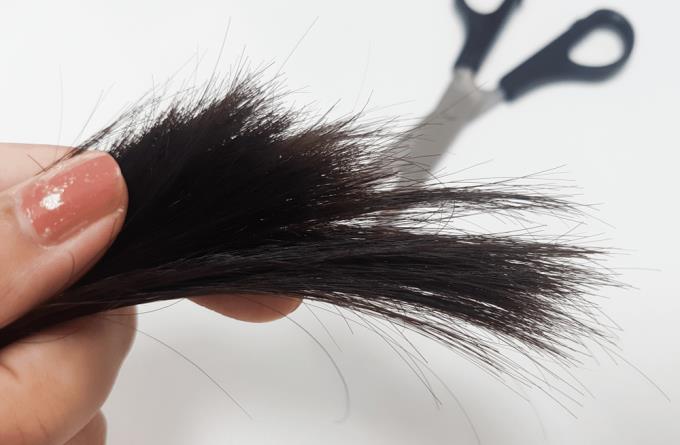The old belief that a pregnant woman has a haircut will bring many harms. But in fact, this is not true because the haircut does not harm the pregnant mother or the fetus in the abdomen.
The timing of pregnancy, there is a lot to do and should be limited. You need to know what to do, what not to not affect the fetus. However, you need to consider carefully, not everyone tells you what to do. One of the things that many people think that pregnant women should not do is haircut. Is this really true? Let's learn with aFamilyToday Health through the following article.
The truth about the concept of pregnant women cutting hair
You may have heard from an elderly family member or friend that pregnant women should not have a haircut during pregnancy. This is one of the most popular and long-standing thoughts associated with pregnancy.
Prejudice
According to ancient beliefs, hair helps protect you from the cold, equivalent to a source of vitality. The haircut by pregnant women means you give away a portion of life energy. This action is so powerful that you can shorten your life or invite negative things to happen.
Truth
When you are pregnant, the body releases a variety of hormones, most of which are in constant or elevated state. You may notice many irregularities with hair thickness and texture, such as sparse hair, drier hairs, and heavy hair loss when washing your hair.
In fact, pregnant women cut their hair to make it appear more voluminous and healthy. This will not harm you or the baby. However, if pregnant women are using some other styling products such as sprays or dyes , they can cause some things not good for the fetus.
Safety measures if you want to change hairstyles during pregnancy

Although cutting hair during pregnancy will not harm mother and baby, you should also pay attention when going to the salon:
Avoid using chemicals
Limit the use of beauty methods such as dyeing, spraying, and hair shade during pregnancy. Medical experts' opinions about the safety of these practices vary. Therefore, it is a wise decision to pause hair beauty with the above methods during this stage.
Avoid crowded hair salons
Another reason why many people recommend avoiding cutting your hair during pregnancy is the crowding and potential unhygienic hairdressers. Pregnant women sitting for too long in a crowded space will get tired and may fall. If you still want to visit a familiar but crowded hair salon, make reservations in advance or choose a time when the salon is relatively empty.
Hair care for pregnant women
There are many things you can do to ensure healthy, shiny hair, and reduce hair loss, thereby reducing the number of cuts during pregnancy:
Massage hair with essential oils
One of the best hair treatments is using essential oils to massage your hair. You can pour the essential oil onto the palm of your hand, rub it evenly, then apply it evenly to your hair and scalp. Popular essential oils include:
Olive oil, coconut oil: moisturizing, suitable for dry hair and split ends
Lavender oil: good in stimulating hair growth
Rosemary oil: helps increase thickness
Chamomile oil: makes your hair soft and shiny
Cedar wood oil: limit hair loss.
Choose the right shampoo and conditioner
One of the secrets to hair care for pregnant women is to choose a good shampoo and conditioner. The shampoo has a cleansing effect and is fragrant. Also, if the product contains the right ingredients, it can also improve and control hair conditions like dandruff.
A good moisturizing conditioner contains nutrients that soften and nourish hair. The product will adjust the pH of the hair and smooth the hair cuticles (the protective outer layer that covers each strand of hair).
Regularly trim your hair

Pruning or cutting hair is not harmful to both the pregnant mother and the fetus. Trimming the ends regularly will help prevent split ends. In addition, a neat, decent appearance will also help you feel more confident about yourself.
Do not brush your hair when wet
Hair is most susceptible to damage while still wet. If you brush your hair as soon as you shower, the strands of hair will easily break.
Understand hair type and scalp
Before using any shampoo, conditioner or conditioner, you should find out the type of hair and scalp, for example if your hair is thick or thin, straight or curly, dull or shiny, scalp dry, oily or normal. often. In case you have any problem like dandruff, hair brittle, or too thin, choose a shampoo and conditioner that are suitable for that condition.
Do not tie your hair tightly
Hairstyles that need to be tied and stretched can cause more hair loss. Therefore, pregnant mothers should not tie ponytails, braids, and bun too long as well as too tight.
Fenugreek
Fenugreek is great for hair growth, helping to keep hair strong and for a beautiful shine. Therefore, you can try this herb with the following recipe:
Add 1 tablespoon of fenugreek per cup of water and leave overnight.
The next morning, blend it into a smooth paste and apply it to your hair.
Wait about 1 hour, finally wash off.
Relieve stress
Stress is the main cause of hair loss during pregnancy, making pregnant mothers have to cut their hair. Stress stimulates hair loss and also causes white blood cells to attack hair follicles. To reduce stress, take steps like going for a walk, doing breathing exercises or yoga.













